仁爱英语七年级上册Unit2,topic1知识点讲解及随堂练习
仁爱英语七年级上册Unit2-topic1知识点讲解及随堂练习
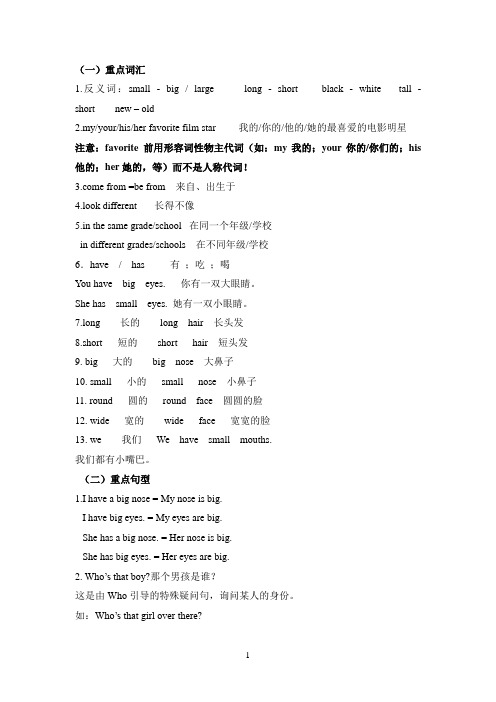
(一)重点词汇1.反义词:small - big / large long - short black - white tall - short new – old2.my/your/his/her favorite film star 我的/你的/他的/她的最喜爱的电影明星注意:favorite 前用形容词性物主代词(如:my我的;your你的/你们的;his 他的;her她的,等)而不是人称代词!e from =be from 来自、出生于4.look different 长得不像5.in the same grade/school 在同一个年级/学校in different grades/schools 在不同年级/学校6.have / has 有;吃;喝You have big eyes. 你有一双大眼睛。
She has small eyes. 她有一双小眼睛。
7.long 长的long hair 长头发8.short 短的short hair 短头发9. big 大的big nose 大鼻子10. small 小的small nose 小鼻子11. round 圆的round face 圆圆的脸12. wide 宽的wide face 宽宽的脸13. we 我们We have small mouths.我们都有小嘴巴。
(二)重点句型1.I have a big nose = My nose is big.I have big eyes. = My eyes are big.She has a big nose. = Her nose is big.She has big eyes. = Her eyes are big.2. Who’s that boy?那个男孩是谁?这是由Who引导的特殊疑问句,询问某人的身份。
如:Who’s that girl over there?Who’s 是Who is 的缩写形式。
仁爱版英语七年级上u2知识点
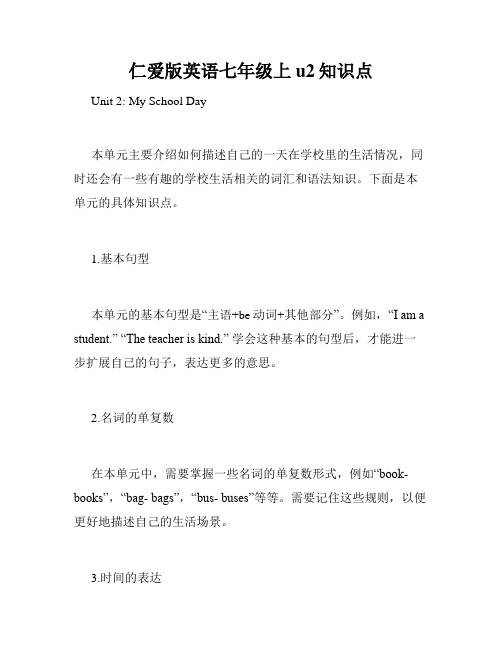
仁爱版英语七年级上u2知识点Unit 2: My School Day本单元主要介绍如何描述自己的一天在学校里的生活情况,同时还会有一些有趣的学校生活相关的词汇和语法知识。
下面是本单元的具体知识点。
1.基本句型本单元的基本句型是“主语+be动词+其他部分”。
例如,“I am a student.” “The teacher is kind.” 学会这种基本的句型后,才能进一步扩展自己的句子,表达更多的意思。
2.名词的单复数在本单元中,需要掌握一些名词的单复数形式,例如“book- books”,“bag- bags”,“bus- buses”等等。
需要记住这些规则,以便更好地描述自己的生活场景。
3.时间的表达在学校的生活中,时间的表达非常重要。
本单元会涉及到时间的表达方式,例如“8:30”可以说为“eight thirty”,“11:45”可以说为“eleven forty-five”。
学生需要注意这些表达,以免混淆时间。
4.疑问句“who”, “what”, “when”, “where”, “which” 等疑问词在英语中是很常见的。
在本单元中,学生将学会如何使用这些疑问词构造疑问句,例如“Who is your English teacher?” “What time do you have lunch?”等等。
5.语法知识本单元涉及到一些简单的语法知识,例如动词的三单形式,以及名词所有格的表达方式等等。
这些知识点的理解将有助于学生更好地掌握英语语言。
总体来说,本单元的知识点较为简单明了,但是需要学生花费时间积累和实践运用。
希望学生们能够善用教材和课堂时间,尽快掌握这些知识点,为自己的英语学习打下坚实的基础。
Unit2+Topic1+Section+C+讲义 仁爱版七年级英语上册
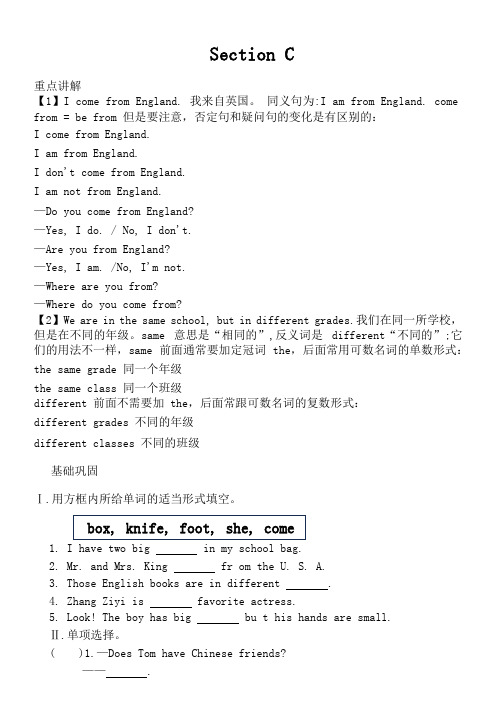
Section C重点讲解【1】I come from England. 我来自英国。
同义句为:I am from England. come from = be from 但是要注意,否定句和疑问句的变化是有区别的:I come from England.I am from England.I don't come from England.I am not from England.—Do you come from England?—Yes, I do. / No, I don't.—Are you from England?—Yes, I am. /No, I'm not.—Where are you from?—Where do you come from?【2】We are in the same school, but in different grades.我们在同一所学校,但是在不同的年级。
same 意思是“相同的”,反义词是 different“不同的”;它们的用法不一样,same 前面通常要加定冠词 the,后面常用可数名词的单数形式:the same grade 同一个年级the same class 同一个班级different 前面不需要加 the,后面常跟可数名词的复数形式:different grades 不同的年级different classes 不同的班级基础巩固Ⅰ.用方框内所给单词的适当形式填空。
1. I have two big in my school bag.2. Mr. and Mrs. King fr om the U. S. A.3. Those English books are in different .4. Zhang Ziyi is favorite actress.5. Look! The boy has big bu t his hands are small.Ⅱ.单项选择。
初中英语 仁爱版七年级上册Unit 1 Topic2知识点
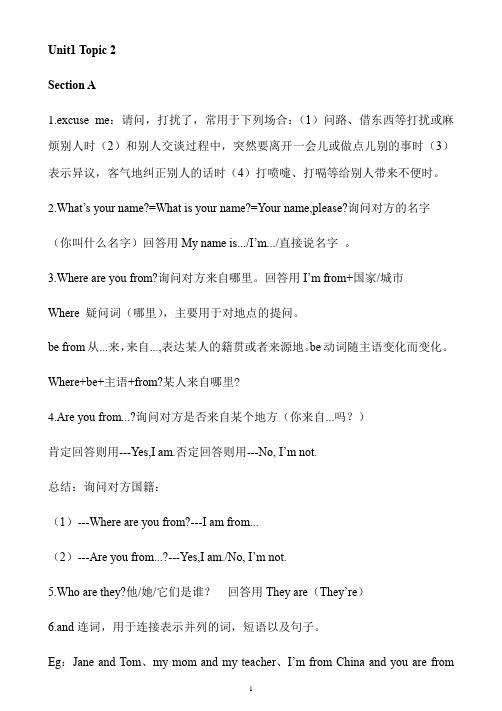
Unit1 Topic 2Section A1.excuse me:请问,打扰了,常用于下列场合:(1)问路、借东西等打扰或麻烦别人时(2)和别人交谈过程中,突然要离开一会儿或做点儿别的事时(3)表示异议,客气地纠正别人的话时(4)打喷嚏、打嗝等给别人带来不便时。
2.What’s your name?=What is your name?=Your name,please?询问对方的名字(你叫什么名字)回答用My name is.../I’m.../直接说名字。
3.Where are you from?询问对方来自哪里。
回答用I’m from+国家/城市Where 疑问词(哪里),主要用于对地点的提问。
be from从...来,来自...,表达某人的籍贯或者来源地。
be动词随主语变化而变化。
Where+be+主语+from?某人来自哪里?4.Are you from...?询问对方是否来自某个地方(你来自...吗?)肯定回答则用---Yes,I am.否定回答则用---No, I’m not.总结:询问对方国籍:(1)---Where are you from?---I am from...(2)---Are you from...?---Yes,I am./No, I’m not.5.Who are they?他/她/它们是谁?回答用They are(They’re)6.and连词,用于连接表示并列的词,短语以及句子。
Eg:Jane and Tom、my mom and my teacher、I’m from China and you are fromJapan.7.Where are they from?句中的they是第三人称复数,译为他/她/它们,后面的be动词要用are。
如:他们来自哪里?Where are they from?他们来自美国。
They are from America.他们来自日本吗?Are they from Japan?8.开音节单词指的是以发音的元音字母结尾的或以“元音字母+辅音字母(除r 外)+不发音的e”结尾的重读音节单词。
仁爱版七年级英语上册Unit2 Topic1 _课文重难点讲解

Unit2 Topic1 课文重难点讲解【1】I have a small nose, but he has a big one. 我长着小鼻子,但是他长着大鼻子。
1) 这里的have是实义动词,意为“拥有”,第三人称单数用has。
如:I have a nice knife.我有一个漂亮的小刀。
I don’t have a nice knife.我没有一个漂亮的小刀。
—Do you have a nice knife?你有一个漂亮的小刀吗?—Yes, I do./No, I don’t.是的,我有。
/不,我没有。
He has a pen.他有一支钢笔。
He doesn’t have a pen.他没有一支钢笔。
此句型还可以转换成主语(物)+be动词+形容词。
如:I have a small nose, but he has a big one.的同义句为:My nose is small, but his nose is big.我的鼻子小,但他的鼻子大。
2) one在这里作代词,用来替代已提及的或已知道的某个名词。
如:You have a long ruler, but Ann has a short one.你有一把长尺子,但安有一把短尺子。
【2】—Oh, I know. You are Kangkang.哦,我知道了,你是康康。
—Yes,you’re right.是的, 你是正确的。
(l) know 知道,了解,懂得,认识(2)right adj.正确的right在这里是形容词。
You are right.相当于That’s right.你是正确的(你说得对)。
【拓展】right n.右边反义词: left左边【3】Michael, who is your favorite actor? 迈克尔, 谁是你最喜欢的演员?favorite作形容词,意为“最喜欢的……”,相当于like …best。
仁爱英语七年级上册语法精讲(一)
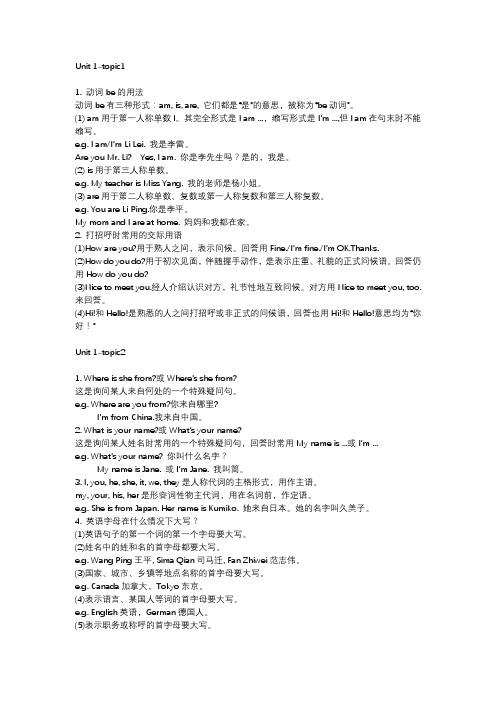
Unit 1-topic11. 动词be的用法动词be有三种形式:am, is, are, 它们都是“是”的意思,被称为“be动词”。
(1) am用于第一人称单数I。
其完全形式是I am ...,缩写形式是I’m ...,但I am在句末时不能缩写。
e.g. I am/I’m Li Lei. 我是李雷。
Are you Mr. Li? Yes, I am. 你是李先生吗?是的,我是。
(2) is用于第三人称单数。
e.g. My teacher is Miss Yang. 我的老师是杨小姐。
(3) are用于第二人称单数、复数或第一人称复数和第三人称复数。
e.g. You are Li Ping.你是李平。
My mom and I are at home. 妈妈和我都在家。
2. 打招呼时常用的交际用语(1)How are you?用于熟人之间,表示问候。
回答用Fine./I’m fine./I’m OK.Thanks.(2)How do you do?用于初次见面,伴随握手动作,是表示庄重、礼貌的正式问候语。
回答仍用How do you do?(3)Nice to meet you.经人介绍认识对方,礼节性地互致问候。
对方用Nice to meet you, too.来回答。
(4)Hi!和Hello!是熟悉的人之间打招呼或非正式的问候语,回答也用Hi!和Hello!意思均为“你好!”Unit 1-topic21. Where is she from?或Where’s she from?这是询问某人来自何处的一个特殊疑问句。
e.g. Where are you from?你来自哪里?I’m from China.我来自中国。
2. What is your name?或What’s your name?这是询问某人姓名时常用的一个特殊疑问句,回答时常用My name is ...或I’m ...e.g. What’s your name? 你叫什么名字?My name is Jane. 或I’m Jane. 我叫简。
初中英语 仁爱版七年级上册Unit2Topic1知识点
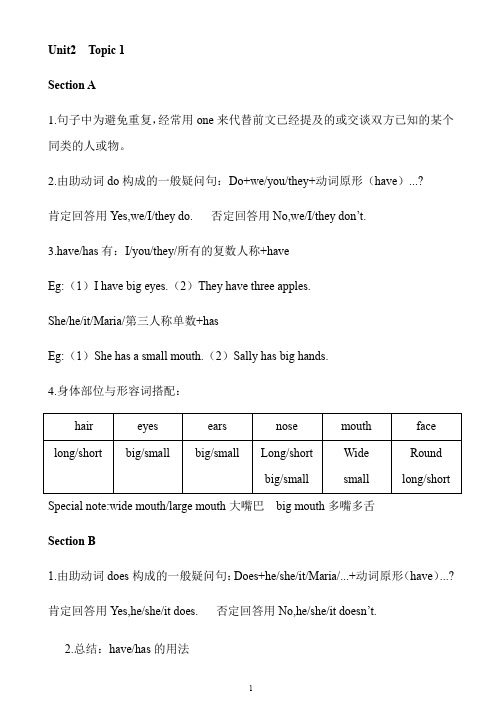
Unit2 Topic 1Section A1.句子中为避免重复,经常用one来代替前文已经提及的或交谈双方已知的某个同类的人或物。
2.由助动词do构成的一般疑问句:Do+we/you/they+动词原形(have)...?肯定回答用Yes,we/I/they do. 否定回答用No,we/I/they don’t.3.have/has有:I/you/they/所有的复数人称+haveEg:(1)I have big eyes.(2)They have three apples.She/he/it/Maria/第三人称单数+hasEg:(1)She has a small mouth.(2)Sally has big hands.4.身体部位与形容词搭配:Special note:wide mouth/large mouth大嘴巴big mouth多嘴多舌Section B1.由助动词does构成的一般疑问句:Does+he/she/it/Maria/...+动词原形(have)...?肯定回答用Yes,he/she/it does. 否定回答用No,he/she/it doesn’t.2.总结:have/has的用法肯定句:(1)He/She/It(第三人称单数)+has...(2)I/You/We/They(非第三人称单数)+have一般疑问句:(1)Does+he/she/it(第三人称单数)+have...?肯定回答:Yes,she/he /it does. 否定回答:No,she/he/it doesn’t.(2)Do+you/they/we(非第三人称单数)+have...?肯定回答:Yes,I/we/they do. 否定回答:No,I/we/they don’t.Section Ce from=be from来自.... eg:We come from China.=We are from China.当主语是单数第三人称时,be动词用is,come用comesEg :She is from Beijing,China.=She comes from Beijing,China.2.当一个句子中出现多个名词并列时,书写时分别用逗号隔开,且最后两个用and连接。
仁爱英语七年级上册unit2topic1知识点讲解及随堂练习复习过程.docx
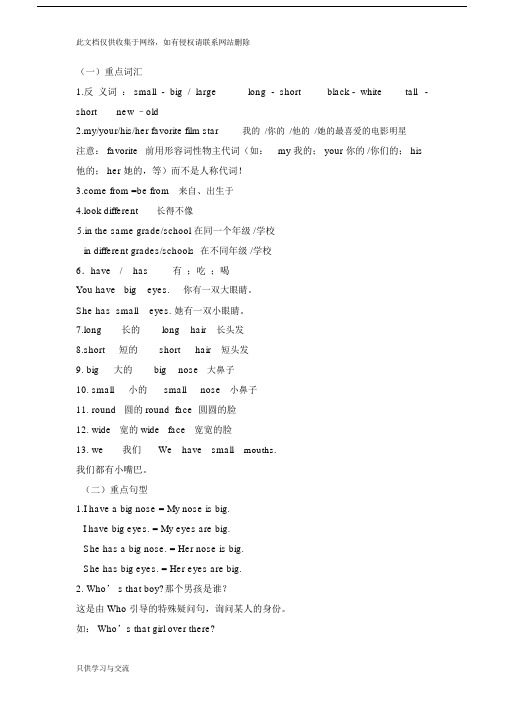
(一)重点词汇1.反义词: small - big / large long - short black - white tall -short new –old2.my/your/his/her favorite film star我的/你的/他的/她的最喜爱的电影明星注意: favorite前用形容词性物主代词(如:my 我的; your 你的 /你们的; his 他的; her 她的,等)而不是人称代词!e from =be from来自、出生于4.look different长得不像5.in the same grade/school 在同一个年级 /学校in different grades/schools 在不同年级 /学校6.have / has有;吃;喝You have big eyes.你有一双大眼睛。
She has small eyes. 她有一双小眼睛。
7.long长的long hair长头发8.short短的short hair短头发9. big大的big nose大鼻子10. small小的small nose小鼻子11.round 圆的round face 圆圆的脸12.wide 宽的wide face 宽宽的脸13. we我们We have small mouths.我们都有小嘴巴。
(二)重点句型1.I have a big nose = My nose is big.I have big eyes. = My eyes are big.She has a big nose. = Her nose is big.She has big eyes. = Her eyes are big.2. Who’ s that boy?那个男孩是谁?这是由 Who 引导的特殊疑问句,询问某人的身份。
如: Who’s that girl over there?Who’ s 是 Who is 的写形式。
仁爱英语七年级上册Unit2-topic1知识点讲解及随堂测试

精心整理(一)重点词汇1.反义词:small-big/large long-short black-white tall-short new–old2.my/your/his/herfavoritefilmstar 我的/你的/他的/她的最喜爱的电影明星注意:favorite前用形容词性物主代词(如:my我的;your你的/你们的;his他的;her她的,等)而不是人称代词!efrom=befrom 来自、出生于4.lookdifferent 长得不像5.inthesamegrade/school 在同一个年级/学校indifferentgrades/schools 在不同年级/6.have/has有;吃;喝Youhavebigeyes.你有一双大眼睛。
Shehassmalleyes.7.long长的longhair长头发8.short9.big10.small11.round12.wide宽的wideface宽宽的脸13.we我们Wehavesmallmouths.我们都有小嘴巴。
(二)重点句型1.Ihaveabignose=Mynoseisbig.Ihavebigeyes.=Myeyesarebig..Shehasabignose.=Hernoseisbig.Shehasbigeyes.=Hereyesarebig.2.Who’sthatboy?那个男孩是谁?这是由Who引导的特殊疑问句,询问某人的身份。
如:Who’sthatgirloverthere?Who’s是Whois的缩写形式。
名词和代词和am,is,are,have,has的连词都可以使用缩写形式。
助动词和情态动词的否定形式也可以缩写。
如:Whois=Who’sWhoare=Who’reWhatis=What’sWhatare=What’reThatis=That’scannot=can’tdonot=don’tdoesnot=doesn’tTomis=Tom’stheyare=they’re3.Whereishefrom?他来自哪里?此句是where引导的特殊疑问句,旨在询问别人的家乡在哪里或对方的出生地。
仁爱英语七年级上册unit1知识点+习题
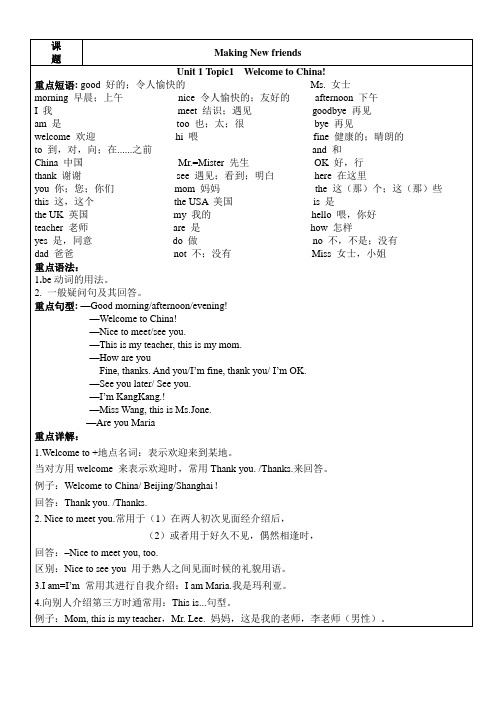
five 五six 六seven 七eight 八nine 九ten 十telephone 打电话number 号码;数,数字;数量it 它重点语法:1.be动词的用法。
2. 人称代词。
重点句型:What’s your name你叫什么名字?---- My name’s …(人名)Where +be动词+主语+from 某人来自哪里?Where are you from 你来自哪里?-----I’m from…(国名或地名)Who is she 她是谁?---She is…(人名)Who are they 他们是谁---They are…(人名)and …(人名)Are you from Canada 你来自加拿大吗?---Yes, I am. No, I’m not.What’s your telephone number 你的电话号码是多少?----回答:My telephone number is…(数字)It’s…(数字)或者直接回答数字。
重点详解:1、Excuse me,are you Jane请问,你是简吗?excuse me是日常生活中人们向对方提出请求、询问情况或打搅他人时所常用的客套语,以示歉意或礼貌。
2、—What’s your name?你叫什么名字?—My name’s Sally.我的名字叫莎莉。
What’s your name 本对话用来询问姓名。
用于询问对方的姓名,常用在上级对下级、长者对年轻人、同学或平辈之间。
这里的name因为是单数形式,所以be动词也用单数形式is,这里的name’是name is 的缩写。
3、Where are from你来自哪里?(1)be from 从……来,来自,be动词的形式随着主语人称变化而变化,它的近义词组是come from…,例子:I am from China .= I come from China. 我来自中国。
(2)以where 开头的特殊疑问句,是对地点提问,其答语通常是含有一个地点的词或词组。
仁爱版英语七年级上册-Unit-2-Topic-1习题及答案

仁爱版英语七年级上册Unit 2 Topic 1第二部分基础知识运用(55分)Ⅰ.单项选择。
(10分)( )1. —____ is your teacher?—It’s Miss Gao.A. WhatB. WhoC. WhereD. How ( )2. Tony and I are good friends, but we are in different ____.A. classesB. schoolC. gradeD. age ( )3. Her hair ____ black and long.A. hasB. amC. isD. are ( )4. —____ Wang Fang have two small eyes?—No, she has two big eyes.A. DoesB. DoC. IsD. Are ( )5. Mr. Lee is English. He comes from ____.A. CanadaB. EnglandC. JapanD. China ( )6. —Look, the girl has long legs.—____A. That’s right.B. Yes, she is.C. Thanks.D. Good. ( )7. —Does Li Ying have a small mouth?—No, she has a wide ____.A. itB. themC. oneD. ones ( )8. I ____ a big nose, but he ____ a small nose.A. have; haveB. have; hasC. has; hasD. has; have ( )9. They are in ____ but in ____.A. same grade; different classesB. the same grade; different classesC. same grades; different classD. the same grades; different class ( )10. —Do the two boys have big noses?—____A. Yes, they are.B. No, they aren’t.C. No, they have big ones.D. Yes, they do.( )11. ____ bikes are red. ____ are blue.A. We; TheyB. Our; TheirC. Our; TheirsD. We; Their( )12. The dress ____ yours.A. lookB. looksC. looks likeD. are( )13. Please give this book ____ Jack.A. atB. toC. inD. from( )14. —You are nice in this dress.—____A. It’s right.B. No, it isn’t.C. Thank you.D. OK. ( )15. Please ____ us find his bike.A. thinkB. helpC. guessD. knoⅡ.情景交际。
仁爱英语七年级上册Unit 1 Topic 2练习题及答案解析
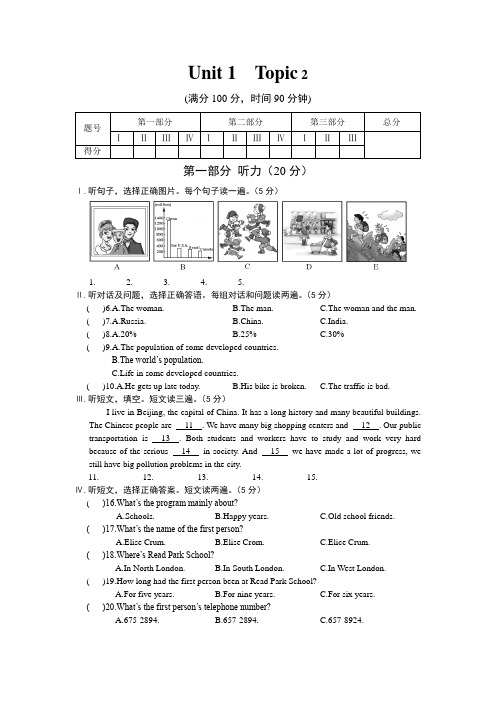
Unit 1 Topic 2(满分100分,时间90分钟)第一部分听力(20分)Ⅰ.听句子,选择正确图片。
每个句子读一遍。
(5分)1._____2._____3._____4._____5._____Ⅱ.听对话及问题,选择正确答语。
每组对话和问题读两遍。
(5分)( )6.A.The woman. B.The man. C.The woman and the man.( )7.A.Russia. B.China. C.India.( )8.A.20% B.25% C.30%( )9.A.The population of some developed countries.B.The world’s population.C.Life in some developed countries.( )10.A.He gets up late today. B.His bike is broken. C.The traffic is bad.Ⅲ.听短文,填空。
短文读三遍。
(5分)I live in Beijing, the capital of China. It has a long history and many beautiful buildings.The Chinese people are 11 . We have many big shopping centers and 12 . Our public transportation is 13 . Both students and workers have to study and work very hard because of the serious 14 in society. And 15 we have made a lot of progress, we still have big pollution problems in the city.11.________ 12.________ 13.________ 14.________ 15.________Ⅳ.听短文,选择正确答案。
七年级上册仁爱英语教材讲解Unit2知识点击

Unit 2 Topic 1 Section ANew wordsNew phrasesUseful expressions知识点击1.Can you guess?你能猜一猜吗?can是情态动词,意为“能,会”,后面接动词原形。
它的一般问句结构是:“Can+主语+ 动词原形+...?”,可用来表示向对方提出请求或要求,也可以表示做某事的能力。
如:—an you help me?你能帮助我吗?—OK.可以。
(表示请求)lean speak English.我会谛英语。
(表示能力)2.I have a small nose, but he has a big one.我的鼻子小,但他的鼻子大。
(1)have意为“有,拥有”,有人称和数的变化,其第三人称单数是has。
此句中have和has 在句中作谓语。
如:Kangkang has big eyes.康康长着一双大眼睛。
I have a small mouth.我长着一张小嘴巴。
【链接】在一般现在时中,have, has的肯定句结构是:“主语+have/has+...”;否定句结构是:“主语+don't/doesn't+have+..."。
主语为第三人称单数时,肯定句用has,否定句用doesn't have; 主语是其他人称时,肯定句用have,否定句用don't have。
如:I /We/You/They have big eyes.我/ 我们/ 你/ 他们眼睛很大。
Hie girl has a small mouth.这个女孩长着一张小嘴。
I don't have long hair.我的头发不长。
May doesn't have big eyes.梅的眼睛不大。
【注意】第三人称单数指he, she, it,可数名词的单数形式,不可数名词等;其他人称指第一人称单复数,第二人称单复数,第三人称复数,可数名词复数等。
仁爱版七年级英语上册Unit 2知识点总结
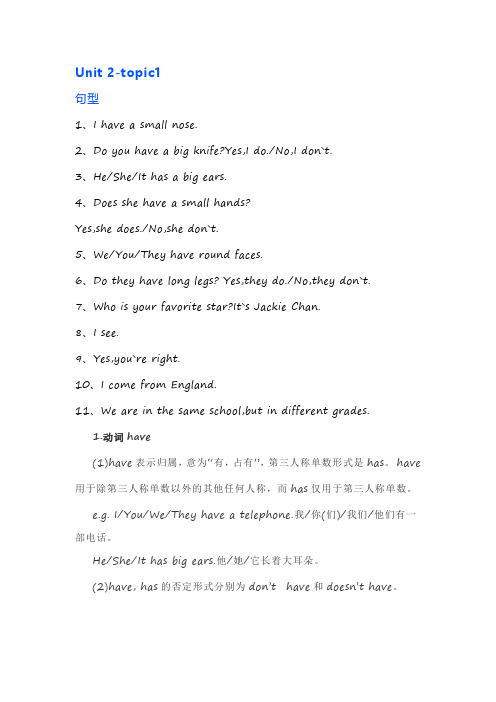
Unit 2-topic1句型1、I have a small nose.2、Do you have a big knife?Yes,I do./No,I don`t.3、He/She/It has a big ears.4、Does she have a small hands?Yes,she does./No,she don`t.5、We/You/They have round faces.6、Do they have long legs? Yes,they do./No,they don`t.7、Who is your favorite star?It`s Jackie Chan.8、I see.9、Yes,you`re right.10、I come from England.11、We are in the same school,but in different grades.1.动词have(1)have表示归属,意为“有,占有”,第三人称单数形式是has。
have 用于除第三人称单数以外的其他任何人称,而has仅用于第三人称单数。
e.g. I/You/We/They have a telephone.我/你(们)/我们/他们有一部电话。
He/She/It has big ears.他/她/它长着大耳朵。
(2)have, has的否定形式分别为don’t have和doesn’t have。
e.g. I/You/We/They don’t have a car.我/你(们)/我们/他们没有小汽车。
He/She/It doesn’t have a friend.他/她/它没有朋友。
(3)have和has的一般疑问句及其答语。
have和has的一般疑问句是在句首加Do或Does构成,谓语动词都是have。
e.g. —Do I/you/we/they have a car?我/你(们)/我们/他们有辆小轿车吗?—Yes, you/I/we/they do.是的,你(们)/我/我们/他们有。
Unit+2+Topic+1同步翻译,重点短语,动名词用法 仁爱版七年级上册英语

句型转换
① 当主语为第三人称单数:变否定句时,在动词前加doesn’t, 动词现原形;变一般疑问句时,在句首加does,动词现原形。 一般疑问句的肯定回答:Yes, 人称代词+does;否定回答:No, 人 称代词+doesn’t. 如:She has small eyes. ---She doesn’t have small eyes. ---Does she have small eyes? ---Yes, she does. /No, she doesn’t.
句型转换
② 当主语为第一、第二人称变否定句,在动词前加don’t,变一 般疑问句,在句首加do,肯定回答:Yes, 人称代词+do;否定回 答:No,人称代词+don’t. They have small eyes. ---They don’t have small eyes. --- Do they have small eyes? ---Yes, they do. / No, they don’t.
重点短语
1. give sb. sth. = give sth. to sb. Please give it to her.
把某物给某人 2. look the same
look different 长相不同,看起来不一样 3. look like 看起来像 He looks like his father. = He and his father look the same. 4. next to 在……旁边 The boy next to me is my good friend.
重点句型
1. Who is your favorite actor? 2. We are in the same school, but we are in different grades. 3. What do/does +主语+look like? ……长得怎么样? ---What does he look like? --- He is not very tall but very strong. 4. We don’t look the same, but we are good friends. We look the same, but we are in different clothes. 5. ---What color is/are +主语?---It’s/ They’re +颜色. ---What color is her hair? ---It’s blond.
七年级上册仁爱英语教材讲解Unit2知识点击
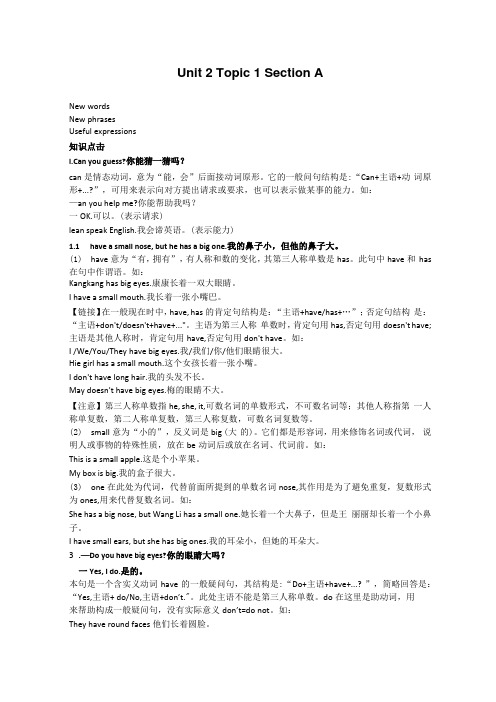
Unit 2 Topic 1 Section ANew wordsNew phrasesUseful expressions知识点击l.Can you guess?你能猜一猜吗?can是情态动词,意为“能,会”后面接动词原形。
它的一般问句结构是:“Can+主语+动词原形+...?”,可用来表示向对方提出请求或要求,也可以表示做某事的能力。
如:—an you help me?你能帮助我吗?一OK.可以。
(表示请求)lean speak English.我会谛英语。
(表示能力)1.1have a small nose, but he has a big one.我的鼻子小,但他的鼻子大。
(1)have意为“有,拥有”,有人称和数的变化,其第三人称单数是has。
此句中have和has 在句中作谓语。
如:Kangkang has big eyes.康康长着一双大眼睛。
I have a small mouth.我长着一张小嘴巴。
【链接】在一般现在时中,have, has的肯定句结构是:“主语+have/has+…”;否定句结构是:“主语+don't/doesn't+have+..."。
主语为第三人称单数时,肯定句用has,否定句用doesn't have;主语是其他人称时,肯定句用have,否定句用don't have。
如:I /We/You/They have big eyes.我/我们/你/他们眼睛很大。
Hie girl has a small mouth.这个女孩长着一张小嘴。
I don't have long hair.我的头发不长。
May doesn't have big eyes.梅的眼睛不大。
【注意】第三人称单数指he, she, it,可数名词的单数形式,不可数名词等;其他人称指第一人称单复数,第二人称单复数,第三人称复数,可数名词复数等。
- 1、下载文档前请自行甄别文档内容的完整性,平台不提供额外的编辑、内容补充、找答案等附加服务。
- 2、"仅部分预览"的文档,不可在线预览部分如存在完整性等问题,可反馈申请退款(可完整预览的文档不适用该条件!)。
- 3、如文档侵犯您的权益,请联系客服反馈,我们会尽快为您处理(人工客服工作时间:9:00-18:30)。
(一)重点词汇1.反义词:small - big / large long - short black - white tall - short new – old2.my/your/his/her favorite film star 我的/你的/他的/她的最喜爱的电影明星注意:favorite 前用形容词性物主代词(如:my我的;your你的/你们的;his 他的;her她的,等)而不是人称代词!e from =be from 来自、出生于4.look different 长得不像5.in the same grade/school 在同一个年级/学校in different grades/schools 在不同年级/学校6.have / has 有;吃;喝You have big eyes. She has small eyes. 你有一双大眼睛。
她有一双小眼睛。
7.long 长的long hair 长头发8.short 短的short hair 短头发9. big 大的big nose 大鼻子10. small 小的small nose 小鼻子11. round 圆的round face 圆圆的脸12. wide 宽的wide face 宽宽的脸13. we 我们We have small mouths.我们都有小嘴巴。
(二)重点句型1.I have a big nose = My nose is big.I have big eyes. = My eyes are big.She has a big nose. = Her nose is big.She has big eyes. = Her eyes are big.2. Who‘s that boy?那个男孩是谁?这是由Who引导的特殊疑问句,询问某人的身份。
如:Who‘s that girl over there?Who‘s 是Who is 的缩写形式。
名词和代词和am ,is ,are ,have ,has 的连词都可以使用缩写形式。
助动词和情态动词的否定形式也可以缩写。
如:Who is =Who‘s Who are =Who‘re What is =What‘s What are = What‘reThat is =That‘s can not=can‘t do not =don‘t does not =doesn‘t Tom is =Tom‘s they are =they‘re3. Where is he from? 他来自哪里?此句是where引导的特殊疑问句,旨在询问别人的家乡在哪里或对方的出生地。
询问―(某人)是哪里人‖,常用Where …from?结构。
be from相当于come from ,因此上句可改为:Where does he come from?4. That‘s right. 是的,你说的对。
That‘s right是对某一观点、判断或回答作评判的用语,或对对方的说法表示赞同,常用That‘s right, 表示―是的,对了,你说的对‖等意思。
有时也可以用You‘re right 或Right, OK来代替。
如:—Are you in Class One? 你在一班吗?—That‘s right.是的/ 没错。
5. I‘m thirteen years old. = I‘m at the age of thirteen. 我13岁了。
6.Please give this letter to Maria. She is in Class Four, Grade Seven.请把这封信给玛丽亚,她在七年级四班。
(1)give 动词,―给‖。
give sth. to sb.―把某物给某人‖相当于give sb. sth. 。
如:Please give this knife to Zhang Hua.Please give Zhang Hua this knife.(2) Class Four, Grade Seven ―七年级四班‖,英语中一般先说小的地方,后说大的地方。
这就是英语和汉语语序的区别。
7. Sorry, I don‘t know her.对不起,我不认识她。
(1)I‘m sorry是英语中最常用的交际礼貌用语之一,意为―对不起‖,口语中也可直接用Sorry。
(2) I don‗t know her.我不认识她。
其中,know 有两种意思,一是―知道‖,二是―认识‖。
在此句中,就是第二个意思。
如:I don't know how to do this work.我不知道如何去做这项工作。
Do you know this man?你认识这个人吗?8. What does she look like?她长什么样子?这是用来询问人的外貌的句型,可根据人的外貌特征直接进行回答。
如:—What does he look like?— He has a round face and big eyes.句中look like ―看起来像……‖,look为连系动词, 意为―看起来‖,―看上去‖,like 为介词,意为―像……‖如:I look like my mother.辨析:look like / be like(1)look like“看起来像”“看上去像……”,指“外观像……”。
(2)be like―像……一样‖,指―品质、性格。
‖如:What does he look like?他长什么样子?What is he like?他是一个什么样的人?(三)重点语法have/has 的用法。
动词have作为"有"使用时,表示"某人(物)有……"用于第一、二人称单数I、you和复数主语,其单数第三人称形式为has,用于第三人称单数he、she、it 和单数主语。
肯定句:主语+have / has+宾语。
例如:1. I have an English book.2. Lily has a dog.3. They have many friends.否定句:在have、has后直接加not。
主语+have not / has not+宾语。
例如:1. You have not a red car.2. She has not a new bike.3. Lily and lucy have not a big family.一般疑问句: 在美语中,要借助于助动词变为问句和否定句,但has要变为have。
在作回答时也要用do或does的形式。
否定句中,用"主语+don't / doesn't+have+宾语"。
例如:1. I don't have an English book.2. She doesn't have a new bike.一般疑问句中,用"Do / Does+主语+have+宾语"。
例如:1. Do you have an English book?Yes, I do. (No, I don't.)2. Does she have any friends?Yes, she does. (No, they doesn't.)特殊疑问句中,用"特殊疑问词+do/ does+主语+have+其它"。
例如:1. What do they have?2. How many friends does Lucy have?用所给单词的适当形式填空1 Her _____( ear) are small and her hair is short.2 They _____( do) have long hair.3 Our English teacher _____( have) a car.4 He has two bi g_____‖( foot).5Ann is eleven_____(year) old .I am eleven ,too.综合填空Adam is a boy. He is thirteen years old. He 1 from England. He is a student. He2 two big eyes, a big nose and a small mouth. He has a sister. Her name is Julia. She is ten. She is a3 , too. She has a small nose , but her mouth is4 . Adam and Julia are in the same school,5 they are in different grades. They have a nice house (房子). Look! They are in the house.1. ___________2. ___________3. ___________4. ___________5. ___________A、对下列的英语词汇进行分类mouth ,small,big ,eye ,long ,short,nose ,hair,hand,face,shoulder,foot,knee,leg, ear,neck,black,brown,arm,blue,red,head,one,two ,three,twelve,thirteen,ten ,1、属于数词的单词有:2、表示身体各部位的名词有:3、表示事物特征的形容词有:B、根据句意及首字母提示补全单词1. He has a w_________ mouth.2. She has b_________ ears, but she has a s_________ face.3. — I know. You are Tom.— Yes, you are r_________.4. They are in d_________ classes, but in the s_________ grade.5. Kate has a r_________ face.C、根据句意,用括号内所给单词的正确形式填空6. This is Li Ming. He _________(have) big hands.7. I have two big _________(foot).8. — Does she _________(have) a small mouth?— Yes, she does.9. Look! Her _________(eye) are big.10. My hair _________(be) black(黑色的) and long.单项选择1. The Changjiang River (长江) is _________. It is 6, 300 km.A. wideB. longC. big2. Tai Lihua _________ big eyes, and her hair _________ long.A. is; isB. has; isC. has; are3. — _________ Wang Fang have two small eyes?— No, she has two big eyes.A. DoesB. DoC. Is4. — Your face is big.— _________A. That‘s all right.B. That‘s right.C. That‘s OK.5. — She has a round face.— _________A. I too am.B. My face is round, too.C. My face,too.6. He doesn‘t _________ a big head but his feet _________ big.A. has; isB. have; areC. has; are7. Linda and Jane are in _________ classes.A. the sameB. differentC. same8. — Do they have a car?— No, _________.A. they doB. they aren‘tC. they don‘t9. — _________ this boy?— He is Liu Li.A. What‘sB. Who‘sC. Where‘s10. My sister is short, _________ I am tall(高).A. andB. or(或者)C. but11. ----Are you in _____class?-----Yes,we are.A sameB the sameC different Dthe different12.Li Ping ____a car.But she has a bus.A hasB haveC don‘t haveD doesn‘t have 13.----Does your sister _____a new school?----No,she doesn‘t.A hasB haveC don‘t haveD doesn‘t have 14.----____you____from English?----No,I come from the U.S.A.A Are ,comeB Do,comeCDoes,come DIs,come15.---What are these?----They are ____.A a busB bikeC Knives DKnifes 16.Linda and I ____in the same school, but in different grades.A am Bis Chave Dare17.---Do you have an eraser?----Yes,I do. I have an old ____.18.Kangkang has short _____,big eyes and a big mouth.A faceB noseC hairD hairs19.He doesn‘t ____a big head but his feet ____big.A has, isB Have, areC Has, areD have,is20.My legs are short_____her legs are long.A andB don,tC doesn,tD But。
